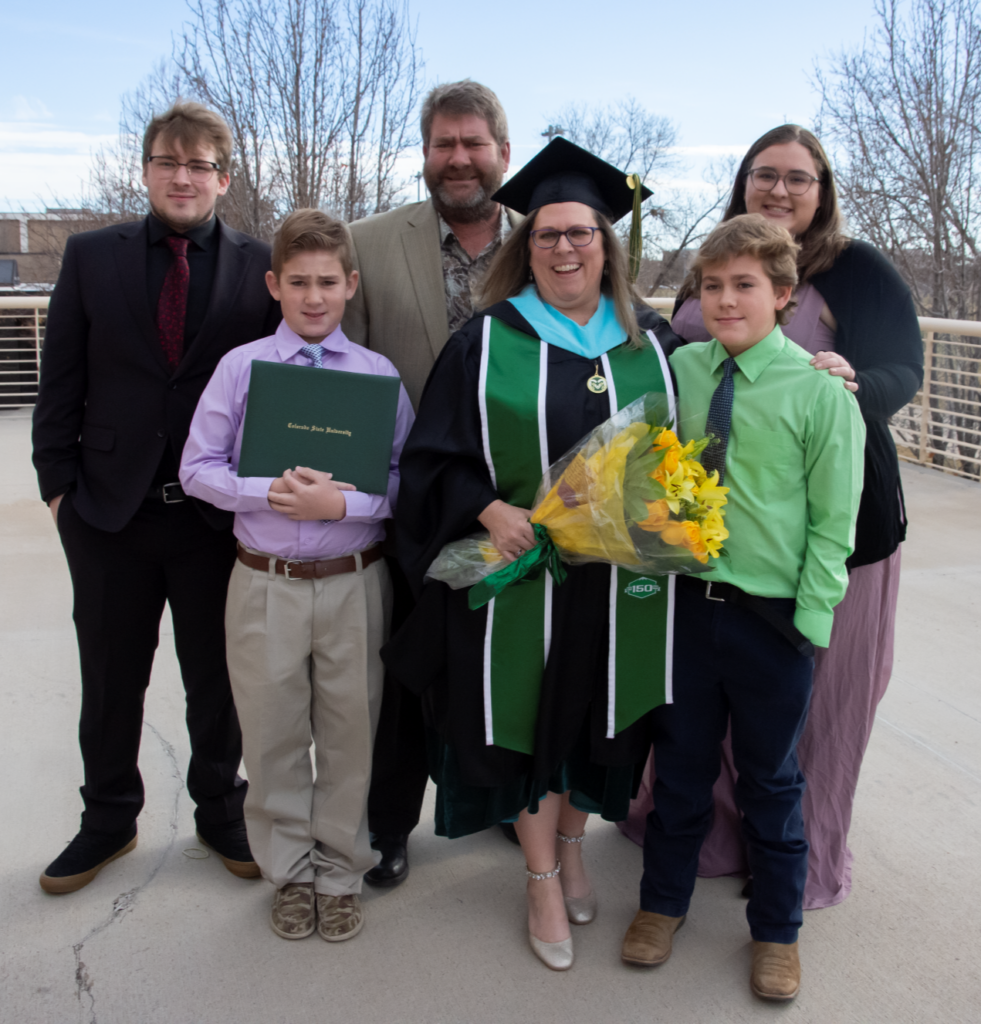As appearing in Source.colostate.edu | Feb., 2024 | by Cheyenne Dolin
Beyond the Routine: An employee’s master’s degree journey and its workplace impact
Allison DeWaele, a mother of four, has been an employee of Colorado State University for 32 years and is now a graduate with a master’s in education.
For DeWaele, the M.Ed. in Education and Human Resource Studies — specialization in Organizational Learning, Performance, and Change was anything but theoretical. She experienced a lot of organizational changes throughout her career and knew the program would expand her knowledge in this area. The program was relevant to her day-to-day job, and her job enriched her academic journey.
DeWaele began working for CSU in 1991 as a resident assistant while attending as an undergraduate. She graduated, married, started a family, and worked in Housing and Dining Services for 25 years. She moved to her current position as an administrative manager in the Graduate School more than five years ago.
As an administrative manager, she provides support in all areas of the Graduate School, including human resources, supervision, office management and administrative support. She advises and guides staff, supervisors and managers through changes and personnel issues.
Knowledge in action
When DeWaele began her studies, the Graduate School was undergoing significant changes in leadership, staff organization, and processes. Then the pandemic began when DeWaele was taking her second class. The class was assigned a project to identify a problem in an organization and discuss how to analyze, design and implement change. DeWaele had no idea what problem to pick, so she set up a meeting with her professor.
Meanwhile, CSU was telling employees to prepare for a transition to remote work. The Graduate School team had a problem – they needed to continue receiving signatures on forms so that degree completion for graduate students would not be stalled. The paper forms required ink signatures and had to be submitted in person to the Graduate School, and the team was not sure how to most efficiently process them remotely. So, DeWaele pulled the operations team into a meeting and together they figured out a solution and a process to circulate the forms via email.
“I wrapped up the meeting with the operations team and was running late to the meeting with my professor. When I arrived, I explained why I was late and that I wasn’t sure what problem to pick for the class project. My professor smiled and told me I had just done the project,” said DeWaele. “I was like: Oh, I already am doing this work; I just need formal training, so I’m more efficient and confident leading my team.”

The ripple effect: education enhancing team performance
With the support of Graduate School leadership, DeWaele was encouraged to continue identifying opportunities for improvement, developing strategies for change and designing ways to evaluate those changes.
DeWaele acknowledges the unwavering support of Mary Stromberger, the former dean of the Graduate School, Sonia Kreidenweis, the former interim dean of the Graduate School, and Colleen Webb, the current vice provost and dean of the Graduate School, as influential women leaders during her pursuit of an advanced degree.
“Watching Allison grow as a professional has been incredibly fulfilling,” said Colleen Webb, vice provost for graduate affairs and dean. “She is putting her new knowledge to work to benefit not just the Graduate School, but the thousands of graduate students, faculty, and staff that we interact with each year. Her willingness to invest in her education and use her employee study benefit has a significant impact on the university.”
As a graduate student, DeWaele realized just how valuable faculty and staff serving as graduate coordinators are in helping students navigate the complexities of a degree program. Consequently, she created monthly graduate coordinator meetings to help break down silos and create a peer network. During the meetings, DeWaele gained a better understanding of the common questions and challenges that graduate coordinators face. To further build on the success of this community, she chose to create formalized training for graduate coordinators as her capstone project. DeWaele hopes the training will help onboard new coordinators more effectively, more efficiently answer questions about processes, and provide resources to help graduate coordinators best support students in their program. The training will launch in 2024.
Advancing professionally
DeWaele was not alone in finding that the OLPC program was extremely relevant to her job. Her peers came from all sectors, including education, military, corporations, local government, and HR — and most had been in the workforce for a while. Their diverse experiences enriched classroom discussions, as students could draw from them when thinking through challenges, strategies, and more.
Moving forward, she plans to apply what she learned every day. DeWaele shares that it was no easy feat obtaining her degree while working full-time and raising a family. “I couldn’t have done it without my supportive network, both at work and at home,” said DeWaele.
With graduation behind her, she looks forward to reconnecting with her family, getting back to her hobbies, and enjoying the weekends again. CSU employees who are interested in advancing their careers can learn more about CSU’s employee study privilege program here.